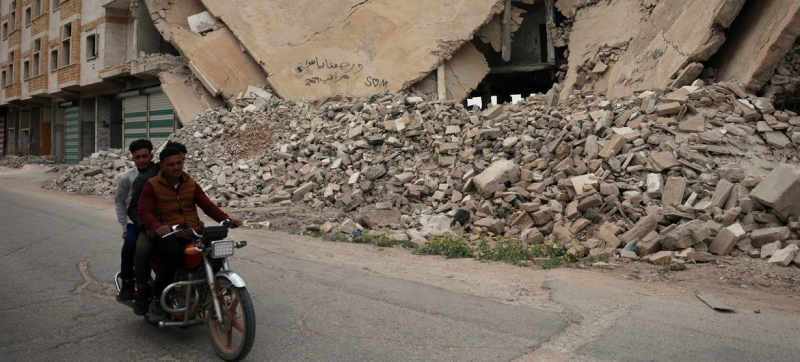- India Sees 9% Drop in Foreign Tourists as Bangladesh Visits Plunge |
- Dhaka Urges Restraint in Pakistan-Afghan War |
- Guterres Urges Action on Safe Migration Pact |
- OpenAI Raises $110B in Amazon-Led Funding |
- Puppet show enchants Children as Boi Mela comes alive on day 2 |
Syria Crisis: Hundreds Killed, Hospitals Overwhelmed by Violence

Syria is recovering after years of conflict and dictatorial rule.
Amid violent clashes in southern Syria’s Sweida governorate, a picture of grave human rights abuses and rising humanitarian needs is emerging by the hour, the UN said on Friday.
Briefing reporters in Geneva, UN human rights office (OHCHR) spokesperson Ravina Shamdasani highlighted “credible” reports of “widespread violations and abuses, including summary executions and arbitrary killings, kidnappings, destruction of private property, and looting of homes” in the city of Sweida.
“Among the reported perpetrators were members of the security forces and individuals affiliated with the interim authorities, as well as other armed elements from the area, including the Druze and Bedouin,” she said.
Many hospitals are struggling to cope with the influx of injured people, the UN refugee agency (UNHCR) also noted.
On Friday morning, OHCHR colleagues reported that clashes were continuing and that “many people are trying to flee or have fled the area,” Ms. Shamdasani continued.
Latest updates from the UN humanitarian affairs coordination office (OCHA) on Thursday indicated that nearly 2,000 families had been displaced from areas affected by the fighting.
Hundreds have reportedly been killed since sectarian violence involving the Druze and Bedouin communities erupted on 12 July, triggering an intervention by Syrian security forces.
OHCHR’s Ms. Shamdasani highlighted an incident on 15 July in which at least 13 people were killed when “armed individuals affiliated with the interim authorities deliberately opened fire at a family gathering.”
Briefing an emergency meeting of the Security Council in New York on Thursday, UN Assistant Secretary-General Khaled Khiari also referenced reports of “civilians, religious figures, and detainees being subjected to extrajudicial executions and humiliating and degrading treatment.” He urged all parties to protect civilians and civilian infrastructure.
Ms. Shamdasani stressed that the UN human rights office has been trying to verify information through “contacts on the ground… families of people who were killed, eyewitnesses,” but that obtaining reliable estimates of the death toll remains challenging.
“There are lots of videos circulating,” she said. “Some claim to be fighters who are in the area filming the abuses and violations they’re carrying out. We are trying to verify some of these videos, but there’s a lot of disinformation out there and much of it is being used to incite further violence and inflame tensions.”
The OHCHR spokesperson also expressed concern about reports of civilian casualties resulting from Israel's airstrikes on Sweida, Dara’a, and central Damascus.
“Attacks such as the one on Damascus on Wednesday pose great risks to civilians and civilian objects,” she warned, calling for the strikes to cease.
Israel had launched the strikes pledging to protect the Druze community.
The violence and displacement have sparked “considerable” humanitarian needs, with the health and aid systems struggling to cope, said William Spindler of the UN refugee agency (UNHCR).
“Many of the hospitals have been overwhelmed by the number of people who have been injured in the recent fighting,” he said.
According to OCHA, the UN World Health Organization (WHO) has dispatched enough trauma and emergency surgery kits for 1,750 interventions to the area, but many “remain undelivered due to access constraints.”
Since the displaced had to flee at very short notice, they are in desperate need of essentials—blankets, jerry cans, solar lamps—but providing these items has been a challenge.
“We have this in stock and we are ready to deliver them as soon as security allows,” Mr. Spindler said. “For now, this has not been possible.”
Mr. Spindler also warned of water shortages due to electricity outages. He said that people are unable to buy bottled water or food because of the insecurity.
UNHCR has an office in rural Sweida, and Mr. Spindler expressed concern about the impact of the hostilities on the agency’s operations, infrastructure, and personnel.
“We know that humanitarian infrastructure has been affected,” he said, describing an incident on 15 July in which a warehouse of the Syrian Arab Red Crescent was severely damaged by shelling.
The UNHCR spokesperson called on all parties to the conflict to respect and protect humanitarian premises, personnel, and assets “in accordance with international humanitarian law.”

